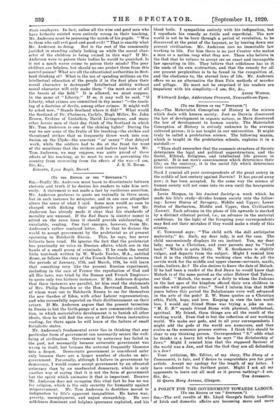[To THE EDITOR OF THE " SPECTATOR."' Sin,—Really Mr. Anderson
must learn to discriminate between rhetoric and truth if he desires his readers to take him seri- ously. A statement is not made a fact by vociferous assertion. Mr. Anderson professes to quote me textually in three cases, but in each instance he misquotes, and in one case altogether alters the sense of what I said. Some men would as soon be charged with filching their neighbour's purse, but Mr. Anderson has already made it clear that his standards of morality are unusual. If the Red Dawn (a sinister name) is edited on the same lines it should provide exhilarating, if unreliable, reading. One fact emerges, however, from Mr. Anderson's rather confused letter. It is that he desires the world to accept government by the proletariat as at present operating in Bolshevik Russia. This, he says, has never hitherto been tried. He ignores the fact that the proletariat has practically no voice in Russian affairs, which are in the hands of a small group of criminals. If he reads the useful little text-book written by W. Warde Fowler, M.A., entitled Rome, or follows the story of the French Revolution as between the periods of January, 1793, and March, 1794, he will learn that something very like the present Russian experiment, including in the case of France the repudiation of God and all His laws, was tried by the Roman and French Empires— to quote only two historic instances. If Mr. Anderson disputes 'that these instances are parallel, let him read the statements of Mrs. Philip Snowden or the Hon. Bertrand Russell, both of whom went out to Bolshevik Russia to see for themselves the new Garden of Eden, with other Labour representatives, and who sorrowfully reported on their disillusionment on their return. If Mr. Anderson argues that the present terrorism in Russia is but the birth-pangs of a new communistic civiliza- tion, in which materialistic developmeitt is to banish all other ideals, then he will find the story of Robert Owen instructive reading, for there again he will learn of the failure of small Socialistic states.
Mr. Anderson's fundamental error lies in thinking that any particular form of government can necessarily secure the well- being of civilization. Government by autocracy has failed in the past, not necessarily because autocratic government was wrong in itself, but because the autocrat frequently blossoms into a despot. Democratic government is considered safer only because there are a larger -number of checks on mis- government. Personally, although I believe in government by democracy, I would sooner accept government by an educated autocracy than by an uneducated democracy, which is only another way of saying that it is not the form of government but the spirit which animates it that is important. Because Mr. Anderson does not recognize this vital fact he has no use for religion, which is the only security for humanity against misgovernment. Mr. Tom Anderson is doubtless moved to indignation by life's apparent inequalities. He hates war, poverty,- unemployment, and unjust stewardship. He sees selfishness dominant and helpless ignorance exploited, and his
blood boils. I sympathize entirely with his indignation, but I repudiate his remedy as futile and superficial. The new world is not to be born through a period of revolution, to be discovered at the point of the bayonet, or by tearing down our present civilization. Mr. Anderson sees no immutable law working in life. For him there is no just Creator who makes a man or a nation reap what they sow. Those who believe in the God that he refuses to accept see an exact and inescapable law operating in life. They believe that selfishness has in it the seeds of its own a3struction, and that the remedy for all our present perplexities is to be found in the recognition of, and the obedience to, the eternal laws of life. Mr. Anderson offers us as an alternative the Sinn Fein methods of murder and pillage. He must not be surprised if his readers are impatient with his simplicity.—I am, Sir, &c., ANGUS WATSON.
Whitewell Lodge, Adderstone Crescent, Newcastle-on-Tyne.


































 Previous page
Previous page